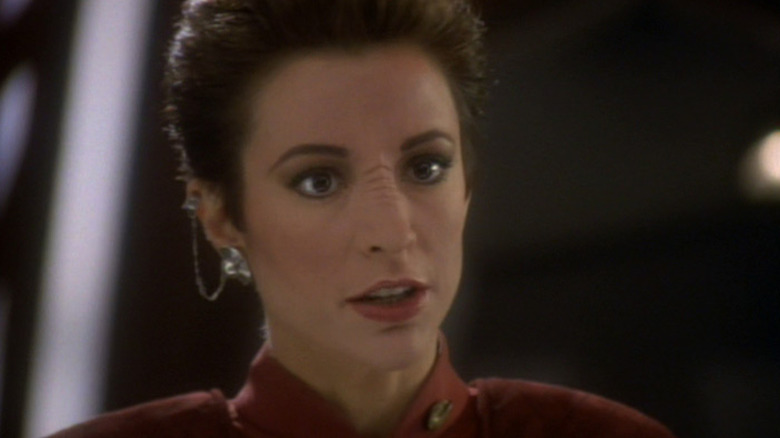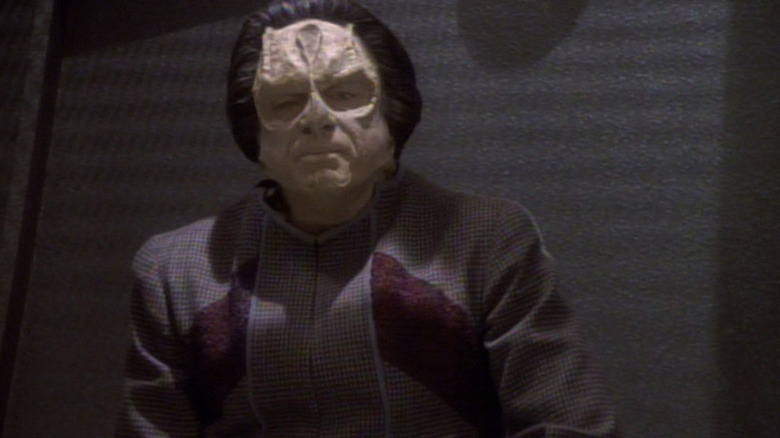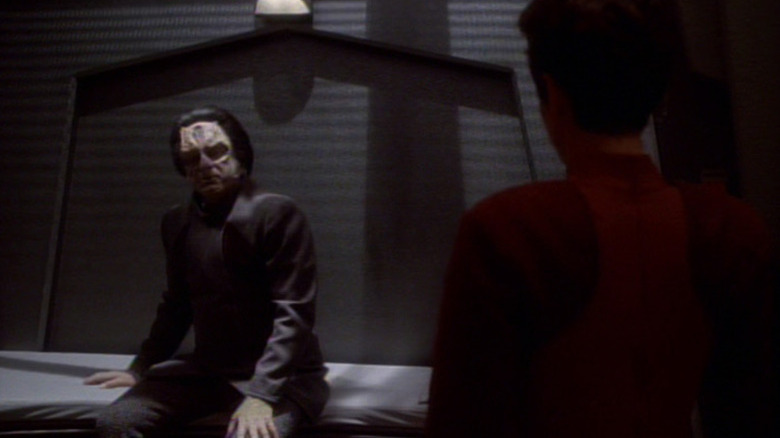Star Trek: Deep Space Nine's Most Famous Twist Has One Big Problem
In the "Star Trek: Deep Space Nine" episode "Duet" (June 14, 1993), a Cardassian named Marritza (Harris Yulin) has stopped by the station to get treatment for a rare ailment. The ailment, however, has only ever been contracted by the denizens of a very particular Cardassian death camp during their military occupation of Bajor. This is evidence that Marritza may be a war criminal who tortured and murdered thousands. When Major Kira (Nana Visitor), once a fighter for the Bajoran resistance, finds that a Cardassian war criminal is on the station, she immediately demands he be arrested. The bulk of "Duet" consists of scenes in DS9's brig, with Kira confronting Marritza about his crimes.
Marritza at first claims that he was a file clerk at the mining camp, and that he didn't witness any war atrocities. Kira doesn't believe him, having witnessed the horrors firsthand. Marritza is also arrogant about his time there, downplaying the severity of the military occupation. But there is a twist. After some investigation, Kira finds that the man in the brig is not the file clerk Marritza, but the leader of the death camp, an evil general named Gul Darhe'el.
Once the truth is revealed, Gul Darhe'el's attitude changes. He doesn't downplay his crimes, but he does begin saying that — from his darkly fascist point of view — committing genocide was a perfectly logical course of action. For Darhe'el, there was nothing wrong with the occupation, and he's not shy about saying so right to Kira's face. Kira, and the audience, have to face Darhe'el's dark-mirror logic. His crimes were too great to achieve justice. Even if he's tortured and killed, the damage is done.
But there's a second twist in "Duet" that moves the audience away from that darkness, and puts it back in the realm of cultural justice. It's a satisfying ending from a writerly perspective, but it does kind of let the audience off the hook in terms of morality.
Duet skirts very close to The Zone of Interest
For a few moments, though, audiences are forced to listen to Gul Darhe'el logic. At the time, viewers would have seen his philosophy as parallel to that of a Nazi, although it can be seen as the viewpoint of any fascist in the modern world, and how they think. Darhe'el lays it out bleakly: The Cardassians needed Bajor's resources to protect their empire, and he saw nothing wrong with plundering the planet, especially after the Bajoran government surrendered to them. If the Cardassians could wipe out the "spineless scum" on the planet, Darhe'el said, "so much the better."
Most darkly, Gul Darhe'el argues that a war tribunal would warrant nothing for the recovering Bajoran people. The dead, he argues, are still dead. Bajor has been permanently damaged, and there's no way it will culturally recover. Putting Darehe'el on trial? Finding him guilty, and publicly punishing him? Those things may fulfill a sacramental thirst for revenge, but it won't undo the damage he has wrought. And it certainly won't force him to feel anything like remorse. He was doing a job, and he feels that he did his job very well, full stop.
For a few dark moments, "Duet" is in the realm of Jonathan Glazer's 2023 film "The Zone of Interest," a terrifyingly deadpan drama about the Nazi family that lived right next door to the Auschwitz concentration camp. That film depicted how easy it was for a Nazi general and his family to ignore the screams of terror and clouds of black smoke that were constantly emanating from the camp. They weren't compartmentalizing. They simply didn't care. It was a career for them. A job that brought them a nice house. They used the ashes of murdered Jews as fertilizer in their garden.
Gul Darhe'el is that Nazi. He doesn't have any thoughts for the humanity of his victims. He only sees a job he can be proud of. It's a dark episode (and it almost turned out differently).
Duet's ending lets us off the hook
"Duet" could have ended there, of course, with Kira realizing that the damage to her planet cannot be undone, and that the perpetrators will never face justice. That the victims of widespread genocidal efforts, of military occupation, of a concerted governmental pogrom of violence, will never see their perpetrators face any kind of retribution that could match the horrors they committed. It would have been a very bleak place to end the episode, of course, but it would have forced both Kira and the audience to face the true horrors of fascism.
But "Duet" kind of backs off at the last minute. It's revealed that Gul Harhe'el was actually Marritza as he originally said. Marritza, it turns out, was present for the Cardassian war atrocities, but was utterly horrified by them. He felt that the Bajorans deserved justice, so he got cosmetic surgery to look like Gul Darhe'el, and orchestrated a scenario where he could be "apprehended" by the Bajoran people. He was willing to let himself be executed if it would being the Bajorans closure, and force the Cardassian government to admit to their crimes. Kira, learning the truth, finds that the monster she had been speaking to was a noble man in disguise. She no longer wants him to die, knowing that it wouldn't be any sort of justice.
The second twist communicates to "Deep Space Nine" viewers that there is indeed nobility in the world, even in the shadow of genocide. There are many people, on both sides, who want justice, and that gives us a glimmer of hope. Whatever happens to Marritza (and he meets a sad fate), the hope will still exist in the galaxy. Kira finds the world to be slightly more complex.
But giving us, the viewers, a drop of hope allows us to (at least partially) ignore the permanent darkness of the fascists. It would have been a much more depressing ending to leave us with that sense of hopelessness, but it would have been far more effective. And, sadly, salient. Still, "Duet" is one of the best episodes of "Deep Space Nine," and you can check out the other top-tier episodes here.


